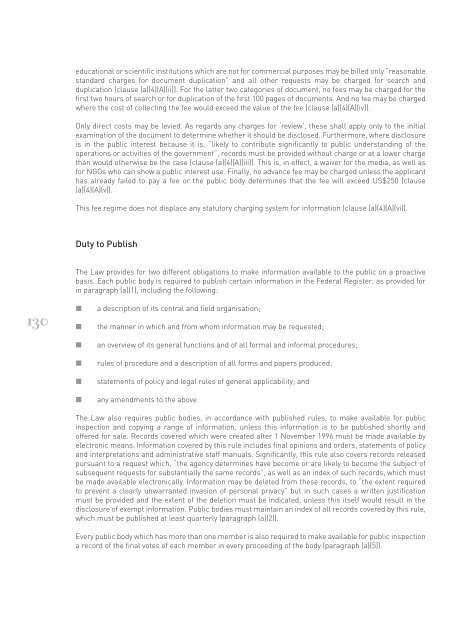Freedom of Information: A Comparative Legal Survey - Federation of ...
Freedom of Information: A Comparative Legal Survey - Federation of ...
Freedom of Information: A Comparative Legal Survey - Federation of ...
You also want an ePaper? Increase the reach of your titles
YUMPU automatically turns print PDFs into web optimized ePapers that Google loves.
130<br />
educational or scientifi c institutions which are not for commercial purposes may be billed only “reasonable<br />
standard charges for document duplication” and all other requests may be charged for search and<br />
duplication (clause (a)(4)(A)(ii)). For the latter two categories <strong>of</strong> document, no fees may be charged for the<br />
fi rst two hours <strong>of</strong> search or for duplication <strong>of</strong> the fi rst 100 pages <strong>of</strong> documents. And no fee may be charged<br />
where the cost <strong>of</strong> collecting the fee would exceed the value <strong>of</strong> the fee (clause (a)(4)(A)(iv)).<br />
Only direct costs may be levied. As regards any charges for ‘review’, these shall apply only to the initial<br />
examination <strong>of</strong> the document to determine whether it should be disclosed. Furthermore, where disclosure<br />
is in the public interest because it is, “likely to contribute signifi cantly to public understanding <strong>of</strong> the<br />
operations or activities <strong>of</strong> the government”, records must be provided without charge or at a lower charge<br />
than would otherwise be the case (clause (a)(4)(A)(iii)). This is, in effect, a waiver for the media, as well as<br />
for NGOs who can show a public interest use. Finally, no advance fee may be charged unless the applicant<br />
has already failed to pay a fee or the public body determines that the fee will exceed US$250 (clause<br />
(a)(4)(A)(v)).<br />
This fee regime does not displace any statutory charging system for information (clause (a)(4)(A)(vi)).<br />
Duty to Publish<br />
The Law provides for two different obligations to make information available to the public on a proactive<br />
basis. Each public body is required to publish certain information in the Federal Register, as provided for<br />
in paragraph (a)(1), including the following:<br />
a description <strong>of</strong> its central and fi eld organisation;<br />
the manner in which and from whom information may be requested;<br />
an overview <strong>of</strong> its general functions and <strong>of</strong> all formal and informal procedures;<br />
rules <strong>of</strong> procedure and a description <strong>of</strong> all forms and papers produced;<br />
statements <strong>of</strong> policy and legal rules <strong>of</strong> general applicability; and<br />
any amendments to the above.<br />
The Law also requires public bodies, in accordance with published rules, to make available for public<br />
inspection and copying a range <strong>of</strong> information, unless this information is to be published shortly and<br />
<strong>of</strong>fered for sale. Records covered which were created after 1 November 1996 must be made available by<br />
electronic means. <strong>Information</strong> covered by this rule includes fi nal opinions and orders, statements <strong>of</strong> policy<br />
and interpretations and administrative staff manuals. Signifi cantly, this rule also covers records released<br />
pursuant to a request which, “the agency determines have become or are likely to become the subject <strong>of</strong><br />
subsequent requests for substantially the same records”, as well as an index <strong>of</strong> such records, which must<br />
be made available electronically. <strong>Information</strong> may be deleted from these records, to “the extent required<br />
to prevent a clearly unwarranted invasion <strong>of</strong> personal privacy” but in such cases a written justifi cation<br />
must be provided and the extent <strong>of</strong> the deletion must be indicated, unless this itself would result in the<br />
disclosure <strong>of</strong> exempt information. Public bodies must maintain an index <strong>of</strong> all records covered by this rule,<br />
which must be published at least quarterly (paragraph (a)(2)).<br />
Every public body which has more than one member is also required to make available for public inspection<br />
a record <strong>of</strong> the fi nal votes <strong>of</strong> each member in every proceeding <strong>of</strong> the body (paragraph (a)(5)).
















